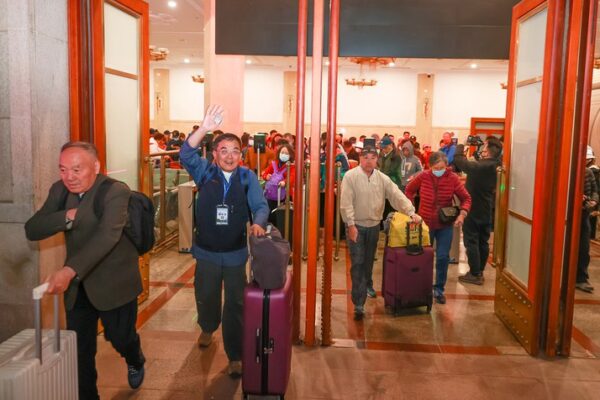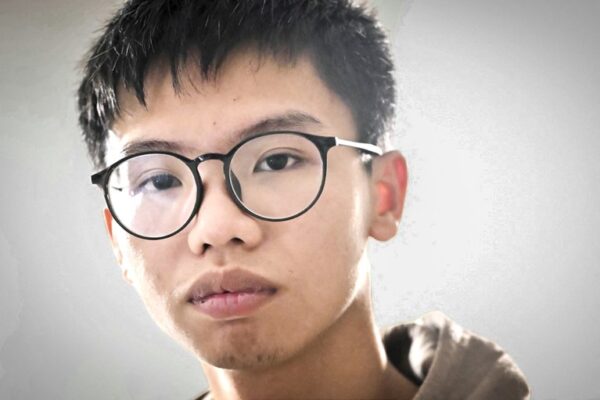U.S. President Joe Biden said Thursday that American military support for the Philippines was “ironclad,” and any attacks against its vessels in the South China Sea would invoke a 1951 treaty that compels each country to come to the other’s aid in the event of a conflict. The comments came ahead of an unprecedented summit between Biden and his Japanese and Philippine counterparts at the White House. A senior U.S. official said the talks were arranged because of the recent flare-up in tensions between Beijing and Manila in the South China Sea. “I want to be clear, the United States’ defense commitments to Japan and to the Philippines are ironclad,” Biden said at the opening of the meeting. “Any attack on Philippine aircraft, vessels or armed forces in the South China Sea would invoke our mutual defense treaty.” The U.S. has a mutual defense treaty with the Philippines and a military alliance with Japan, both of which were inked in 1951. Chinese coast guard vessels fire water cannons towards a Philippine resupply vessel, the Unaizah, on its way to a resupply mission at Second Thomas Shoal (Ayungin Shoal) in the South China Sea, March 5, 2024. (Adrian Portugal/Reuters) Japanese Prime Minister Fumio Kishida and Philippine President Ferdinand Marcos Jr. said that increased trilateral cooperation between the Pacific nations was borne from their shared democratic values and evidenced by joint military drills in the South China Sea last weekend. “It is a partnership born not out of convenience nor of expediency,” Marcos said, “but as a natural progression of a deepening cooperation amongst our three countries, linked by a profound respect for democracy, good governance and the rule of law.” Water cannon attacks Chinese coast guard vessels have in recent weeks fired water cannons at Philippine boats attempting to supply a deliberately sunken warship that serves as a Philippine naval outpost at the Second Thomas Shoal (Ayungin Shoal), with Beijing also warning Manila against trying to access it. The shoal lies in South China Sea waters within the Philippines’ exclusive economic zone, where Manila holds sovereign rights. But Beijing claims most of the sea as its historic territory and says Manila must ask permission from Chinese authorities to access the area. People protest against the Marcos administration’s 2023 decision to grant the United States greater access to military bases in the Philippines, as they demonstrate in a park near the White House in Washington, where the leaders of the U.S., Philippines, and Japan were holding a summit, April 11, 2024. (BenarNews) Earlier on Thursday, Chinese foreign ministry spokesperson Mao Ning accused Manila of “violating China’s sovereignty” for decades due to the half-sunken BRP Sierra Madre, which was grounded at the shoal in 1999 to maintain Manila’s sovereignty but now needs repairs. Speaking at a daily press briefing, Mao said Chinese authorities were “willing to allow” Philippine vessels to freely access the increasingly dilapidated outpost – but only to “tow” it away, and not repair it. She said Manila needed to inform Beijing of any such plans before accessing the area, and then “China will monitor the whole process.” “If the Philippines sends a large amount of construction materials to the warship and attempts to build fixed facilities and a permanent outpost, China will not accept it and will resolutely stop it in accordance with law and regulations to uphold China’s sovereignty,” Mao said. She added that China’s recent “activities” in the South China Sea, such as the water-cannoning of Philippine vessels, “are in full compliance with international law” and “there’s nothing wrong about them.” ‘Crystal clear’ A senior U.S. official, speaking on condition of anonymity prior to the summit, told reporters that Biden had been “crystal clear” about American military support for Manila, and said the flare-ups with China in the South China Sea were an impetus for Thursday’s summit. USS Mobile, JS Akebono, HMAS Warramunga, BRP Antonio Luna and BRP Valentine Diaz sail in formation during a multilateral maritime cooperative exercise between Australia, the United States, Japan and the Philippines within the Philippines’ exclusive economic zone in the South China Sea, April 7, 2024. (POIS Leo Baumgartner/Royal Australian Navy) “It is one of the reasons for the meeting because we are very concerned about what we’ve been seeing,” the official said. “He has repeated many times that the U.S.-Philippines Mutual Defense Treaty applies to the South China Sea, including Philippine vessels that may be underway there, including its coast guard vessels,” the official said. Another U.S. official added that Philippine and Japanese coast guard officers would be welcomed aboard U.S. Coast Guard ships during a maritime exercise later this year “to further train and synchronize our work together” in case of a future attack that sparks a conflict. Philippine activists protesting outside the U.S. Embassy in Manila on April 11, 2024, warned that a Washington summit between the leaders of the Philippines, United States and Japan could provoke an angry response from China over the South China Sea and threaten regional stability. (Gerard Carreon/BenarNews) The two officials also said the United States would help fund a major infrastructure project in the Philippines known as the Luzon corridor, as part of the Partnership for Global Infrastructure and Investment, which is the U.S. answer to China’s high-spending Belt and Road Initiative. The Luzon corridor, they said, would help connect Subic Bay, Clark, Manila and Batangas in the Philippines, with investments in infrastructure “including ports, rail, clean energy, semiconductor supply chains and other forms of connectivity in the Philippines.” “We stand shoulder-to-shoulder with Marcos,” one of the officials said, “ready to support and work with the Philippines at every turn.” U.S. President Joe Biden hosts Philippine President Ferdinand Marcos Jr. and Japan Prime Minister Fumio Kishida for a summit of the three nations’ leaders at the White House, in Washington, April 11, 2024. (Kevin Lamarque/Reuters) In his final remarks before talks opened behind closed-doors Thursday, Biden said the newfound cooperation between the United States, Japan and the Philippines would be a boon…








